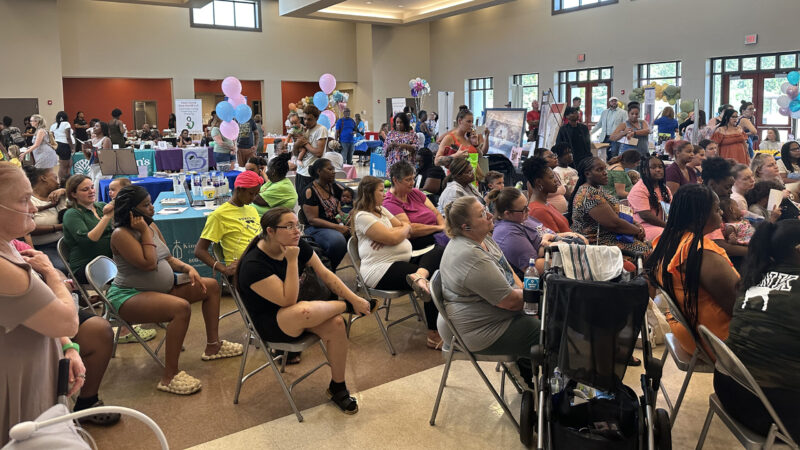A campaign aims to bridge the breastfeeding gap for Black mothers in the Gulf South
Crowds gather at a community Baby Shower hosted by a Mississippi Public Health Institute campaign called Sharing Health Education Awareness, on August 19, 2023 in Missisisppi. The organization focuses on encourage and enable vulnerable communities -- like Black women in the Deep South -- to increase their breastfeeding rates.
Often referred to as “liquid gold” among midwives, research shows that breast milk is the ideal food for growing babies. It provides a host of benefits to both infants and mothers. With an intricately balanced blend of nutrients, antibodies, and enzymes, breast milk supports growth, immunity, and cognitive development.
Despite its well-documented advantages, many regions in the US — especially in the South — continue to grapple with low breastfeeding rates. States like Alabama, Mississippi, and Louisiana have some of the the lowest rates in the country.
Health officials are working to change that by providing resources to new and expectant mothers. They’re also launching programs targeting communities with even lower rates, such as Black mothers, where stigma often deters many from breastfeeding.
One such effort is Sharing Health Education Awareness, or SHEA, a Mississippi Public Health Institute campaign. It uses a targeted, community-centered approach to improve health among Black mothers, babies, and families in the Gulf Coast area. The five-year effort, which is part of the Gulf Coast Healthy Families, Mothers, and Babies Initiative, is being led by the Mississippi Public Health Institute, Gulf Coast Healthy Communities Collaborative, and Coastal Family Health Center with support from partners across the region.
“What we do is we get out into vulnerable communities and we work with the disparities that affect those communities,” said SHEA Program Manager Elizabeth Ozene. “SHEA’s demographic or target group is African-American women who are expecting or have already had a baby. And what we try to do is encourage them to increase their breastfeeding here in Mississippi.”
August is National Breastfeeding Awareness Month, and SHEA has been hosting events to help boost breastfeeding awareness. The group provides resources, educational materials, and encouragement to new and expectant mothers.
Earlier this month, SHEA hosted a “community baby shower.” More than 30 vendors distributed information about breastfeeding, tobacco cessation, active living, and the importance of flu vaccination. Black lactation coaches worked with new moms, showing them techniques to help breastfeed successfully. People who attended were also given essential supplies like diapers, bibs, and burp cloths.
“It’s so important because so many of our young ladies have been misled, or misunderstood the reasoning behind breastfeeding,” Ozene said. “So what we have been doing in recent years is educating them, giving them the proper tools that they need for breastfeeding, and especially with letting them know that your baby’s immune system is not fully developed until they’re five years old. So giving them natural breast milk is by far the most efficient way to nourish their bodies.”
And the benefits extend beyond the purely physiological. Breastfeeding establishes a deep emotional bond between mother and child, nurturing not only the body but also the heart.
Despite strong recommendations to breastfeed, according to a Mississippi Public Health Institute 2023 report, rates of Black mother’s breastfeeding initiation and duration are the lowest in the U.S. compared with those of other racial-ethnic groups, especially in the South.
Aside from stigma, Black women face a lot of obstacles if they want to breastfeed. They often have to return to work soon after giving birth and are less likely to have access to supports like lactation rooms.
The last week of August is Black Breastfeeding Week, and SHEA is hosting a virtual panel discussion on the benefits and misconceptions of breastfeeding.
“Black women on the Gulf Coast are half as likely to have friends or family that breastfed,”
Ozene said. “We hope to change that disparity through educating the Gulf Coast community on the importance of Black maternal health while providing new and expecting moms with healthcare resources and community support.”
The panel will consist of a lactation consultant, a doula, and a Black mother who has recently been through a breastfeeding journey. New and expectant mothers will receive resources and
information to aid their pregnancy and postpartum journey.
“Black women on the Gulf Coast are half as likely to have friends or family that breastfed,” said
Ozene said. “We hope to change that disparity through educating the Gulf Coast community on the importance of Black maternal health while providing new and expecting moms with healthcare resources and community support.”
Mideast clashes breach Olympic truce as athletes gather for Winter Paralympic Games
Fighting intensified in the Middle East during the Olympic truce, in effect through March 15. Flights are being disrupted as athletes and families converge on Italy for the Winter Paralympics.
A U.S. scholarship thrills a teacher in India. Then came the soul-crushing questions
She was thrilled to become the first teacher from a government-sponsored school in India to get a Fulbright exchange award to learn from U.S. schools. People asked two questions that clouded her joy.
Sunday Puzzle: Sandwiched
NPR's Ayesha Rascoe plays the puzzle with WXXI listener Jonathan Black and Weekend Edition Puzzlemaster Will Shortz.
U.S.-Israeli strikes in Iran continue into 2nd day, as the region faces turmoil
Israel said on Sunday it had launched more attacks on Iran, while the Iranian government continued strikes on Israel and on U.S. targets in Gulf states, Iraq and Jordan.
Trump warns Iran not to retaliate after Ayatollah Ali Khamenei is killed
The Iranian government has announced 40 days of mourning. The country's supreme leader was killed following an attack launched by the U.S. and Israel on Saturday against Iran.
Iran fires missiles at Israel and Gulf states after U.S.-Israeli strike kills Khamenei
Iran fired missiles at targets in Israel and Gulf Arab states Sunday after vowing massive retaliation for the killing of Supreme Leader Ayatollah Ali Khamenei by the United States and Israel.








